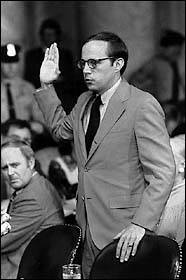|

|
| On June 17,
1972 five burglars broke into the offices of the Democratic National
Committee at Watergate in Washington D.C. The burglars went in to the
office in suits and ties, wearing surgical gloves, and their pockets
stuffed with sequentially numbered $100 bills. They were discovered by
security guard Frank Wills, who had found a door open and called the
police at 1:47 a.m. They arrested the five burglars inside the Democratic
National Committee Headquarters. The burglars had evidence that linked
that linked them to the Committee to Re-Elect the President. |

Liddy standing trial in District Court |
These break-ins were what formed the
boundaries we know as the Watergate Affair.
|
| In January 1973 Hunt and the
Cubans pleaded guilty in U.S. District Court to burglary, conspiracy, and
wire-tapping. Liddy and McCord chose to stand trial and were convicted of
the same charges. They were sentenced to prison terms by District Court
Judge John J. Sirica. |
| Watergate revealed a web of
political spying, sabotage, bribery, and the illegal use of the campaign
funds. The actions and clues led to a series of investigations that
revealed many things about Watergate. They also resulted in the indictments
of around forty government officials and the resignation of the president
Richard Nixon. |
| As it turned out the burglars
were there to adjust bugging equipment they had installed during a May
break-in and to take pictures of the Democrats' documents. |
| FBI director L. Patrick Gray
resigned on April 27 after it was revealed that he had destroyed Watergate
records given to him by John Dean. Senate grouped an investigative team
leaded by Senator Sam Ervin Jr. to look into the growing scandal. Dean
told the Ervin Committee that Nixon had known of the cover up, and a month
later Alexander Butterfield revealed that Nixon had recorded
conversations. The committees tried to get the tapes from Nixon, but all
they got were edited transcripts with gaps that were believed to be
Watergate related conversations. The judge subpoenaed additional tapes.
Nixon refused to bring them. The case then moved to The Supreme Court. The
Supreme Court rued against him by an 8-0 vote. One of the tapes became
known as the "Smoking Gun" tape when it revealed Nixon had
participated in the Watergate Affair as far back as June 23, 1972. |
 |
| Nixon's final days were in
late July to early August 1974. The House Judiciary Committee voted to
accept three out of four proposed articles of impeachment. There were
calls coming from all over the U.S. advising Nixon to resign, including
one from the future President of the United States. |
 On August 8, 1974 at 9:00 p.m. Nixon delivered a nationally televised
resignation speech. The next morning he made his final remarks to the
White House staff before sending his resignation letter to the Secretary
of States, Dr. Henry Kissinger.
On August 8, 1974 at 9:00 p.m. Nixon delivered a nationally televised
resignation speech. The next morning he made his final remarks to the
White House staff before sending his resignation letter to the Secretary
of States, Dr. Henry Kissinger. |
| "Deep Throat"
Deep Throat is one person not a group of several sources.
Deep Throat is a man and he is still living. He had access to information
from the White House, Justice, the FBI, and the CRP. He was a smoker and a
drinker. He often drank scotch and got drunk, which caused him to talke
about his feelings. His name was given to him by Howard Simmons from a
popular porn film at the time. He could only be contacted on very
important occasions. |
| Here is a list of Deep Throat
suspects.
-Henry Kissinger
-Alexander Haig
-Cord Meyer
-William Colby
-L. Patrick Gray
-W. Mark Felt
-Charles Bates
-Robert Kunkel
|
| The identity was not revealed
because he wanted to remain anonymous. The identity of Deep Throat is
still the best kept secret in the United States of America. |
| Watergate was the downfall of
Nixon's presidency and the downfall of a nation and it will never be
forgotten. Watergate was a national crisis that tested and affirmed the
rule of the law. |
| Chris Young
8th American History
Rossville Jr. High
Post-World War II America Project
May 2002 |
Bibliography |



 On August 8, 1974 at 9:00 p.m. Nixon delivered a nationally televised
resignation speech. The next morning he made his final remarks to the
White House staff before sending his resignation letter to the Secretary
of States, Dr. Henry Kissinger.
On August 8, 1974 at 9:00 p.m. Nixon delivered a nationally televised
resignation speech. The next morning he made his final remarks to the
White House staff before sending his resignation letter to the Secretary
of States, Dr. Henry Kissinger.